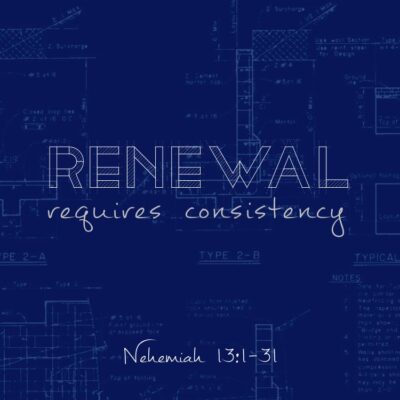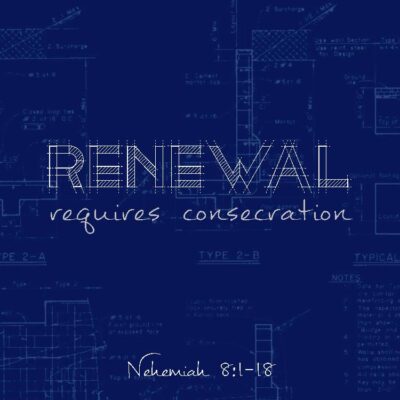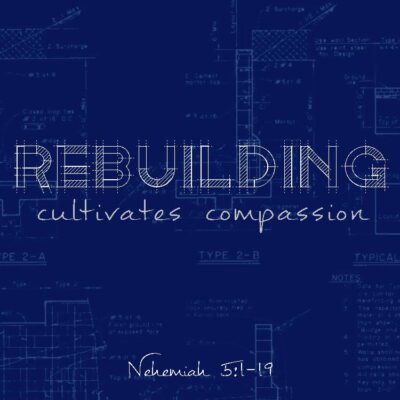Sermons on Nehemiah
As we’ve considered this concept of renewal, we have noted that renewal requires consecration (i.e., being separated to or belonging to God). Renewal also requires confession (i.e., agreeing with God about the sinfulness of your attitude and actions). And we noted that renewal will result in commitment in our sermon last Sunday. Today—as we complete our study in Nehemiah—we will see that renewal requires consistency (i.e., doing something in the same way over a long period of time). So, in this study, we’re going to focus on that concept—consistency in our walk with God—because there is no other way to sustain a spirit of revival.
In Nehemiah 9 and 10, the people covenanted together to “observe and do all the commandments of the Lord.” Now in Nehemiah 11, we see the result of this covenant and how it impacted the lives of these people. Many people pay lip-service to following God—or committing wholly to Him—but commitment to God does not come without effort and sacrifice. As we pray each time before studying God’s Word, we must be doers of the Word, not hearers only.
After restoring the broken-down wall of Jerusalem, the restored exiles needed spiritual direction and renewal—they needed revival. In our study last week, we noted that this process of renewal begins with hearing and obeying the Word of God. In today’s study, we will focus on the role of confessing sin in the renewal process, as well as the attitudes that foster a repentant spirit and the product of confession.
The walls of the city of Jerusalem have been rebuilt, restoring the honor and dignity of that great city. Now it is time for the people of Jerusalem to be restored as well. They were in desperate need of reviving and renewal. Both Ezra and Nehemiah were aware of this need, so Nehemiah called all the people together at the Water Gate and asked Ezra to bring the Law of Moses to read to the people so that they could repent and seek the face of God!
This is the final episode that we will study from the Book of Nehemiah this year. Nehemiah’s story is not finished, but as we see here in this study, the rebuilding of the wall is complete. It was evident to all that the wall’s completion was a work of God. The same can be true of our lives as well–God wants to rebuild the broken aspects of our lives! And when we allow Him to do that, people all around us will be aware that our transformation is being accomplished by the power of God!
As we continue our study in Nehemiah 6, we once again find Nehemiah contending with those who have opposed him from the beginning—only now their tactics have changed. Does that mean that they have changed? Are they now trying to make peace with their neighbors? Nehemiah will have to depend on discernment from God to know what he should do and how he should do it.
By definition, the word compassion means “a feeling of deep sympathy and sorrow for another who is stricken by misfortune, accompanied by a strong desire to alleviate the suffering.” Love and compassion go hand-in-hand. “The opposite of compassion is often thought to be indifference or cold-heartedness. So as we continue to explore the story of Nehemiah, let’s see how he is confronted with an issue and moved to compassion as a result.
Oftentimes, when we set our hearts to do what God has called us to do or to walk according to His Word, opposition is sure to follow. Why is this? What should we do when this happens? As we continue through the book of Nehemiah, we’ll gain some insight into the nature of opposition and how we should respond to it.
As we jump around considering the circumstances and situations of some of these groups listed in chapter three of Nehemiah, we discover four biblical principles of teamwork and leadership: 1) God chooses to work through people, 2) God empowers leaders on all levels, 3) God wants all people to participate, and 4) God wants our work to be meaningful. We’ll unpack each one of these principles as we study this passage.
In the previous study, I introduced you to five principles for restoring the broken. We looked at how Nehemiah started this process with his God-given purpose in mind; and then he seized the opportunity that God set before him. This morning, we’re going to focus on the next two principles on this list—analyze the situation you find yourself in and then motivate your team to join you in the effort. Nehemiah accomplishes this by taking five specific steps.









